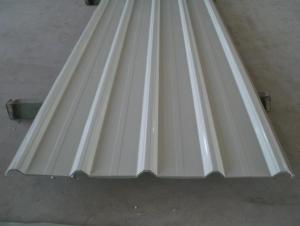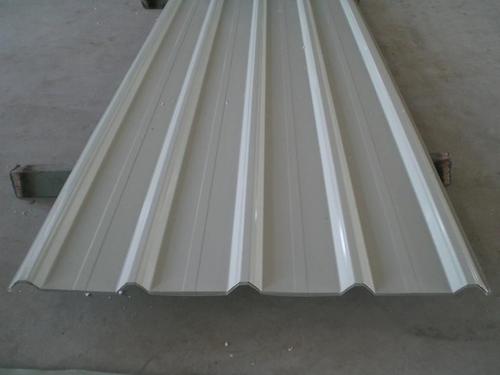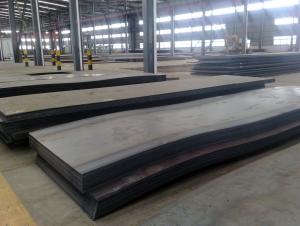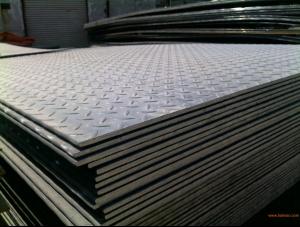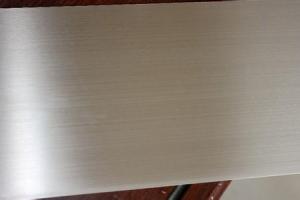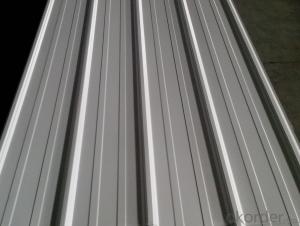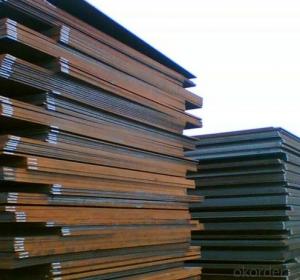Single color plate
- Loading Port:
- China Main Port
- Payment Terms:
- TT OR LC
- Min Order Qty:
- -
- Supply Capability:
- -
OKorder Service Pledge
Quality Product, Order Online Tracking, Timely Delivery
OKorder Financial Service
Credit Rating, Credit Services, Credit Purchasing
You Might Also Like
Color Coated Galvanized Corrugated Steel Roof Key advantages:
--- corrosion resistance: Pre-coated steel offers excellent corrosion resistance achived through continuous hot DIP galvanization and corrosion resistant primer/polyester coating. Protection is achieved when zinc and steel are together in the presence of moisture; The zinc protects the steel by galvanic action.
--- lightweight: Metal covered and metal frame buildings offer the safest possible shelter during the storms. Correctly earthed aluminium, because of its high electrical conductivity, offers excellent protection from lighting damage.
--- Economic: The load weight of the steel corrugated sheets on the substructure is very small. This ensures lighter supporting structurals. The purlin spacings can also be increased considerably ensuring reduction in the number of purlins.
--- Appearance: Prepainted steel profiled building sheet can look outstanding in its simplest plain mill finish. It provides a pleasing architectural beauty to all kinds of buildings with a touch of distinctive modernity.
Prepainted steel roofing sheets can be used extensively and economically as a roof/wall cladding material.
Application:
Modern architectures and buildings such as private houses, shools, medical institutions, government agencies, commercial buildings, entertainment and leisure industries.
Check us out at:Supply high quality roofing materials and best solution !
--- corrosion resistance: Pre-coated steel offers excellent corrosion resistance achived through continuous hot DIP galvanization and corrosion resistant primer/polyester coating. Protection is achieved when zinc and steel are together in the presence of moisture; The zinc protects the steel by galvanic action.
--- lightweight: Metal covered and metal frame buildings offer the safest possible shelter during the storms. Correctly earthed aluminium, because of its high electrical conductivity, offers excellent protection from lighting damage.
--- Economic: The load weight of the steel corrugated sheets on the substructure is very small. This ensures lighter supporting structurals. The purlin spacings can also be increased considerably ensuring reduction in the number of purlins.
--- Appearance: Prepainted steel profiled building sheet can look outstanding in its simplest plain mill finish. It provides a pleasing architectural beauty to all kinds of buildings with a touch of distinctive modernity.
Prepainted steel roofing sheets can be used extensively and economically as a roof/wall cladding material.
Application:
Modern architectures and buildings such as private houses, shools, medical institutions, government agencies, commercial buildings, entertainment and leisure industries.
Check us out at:
www.facebook.com/wosinroofing
www.twitter.com/wosinroofing
| Product | PPGI,prepainted steel coils, color coated steel coils |
| Base Metal | hot galvanized steel or PrePainted Galvanized aLuminium steel |
| Zinc-coating | 30 G/M2- 270 G/M2 as buyer's request |
| Thickness | 0.1 2 - 1.2mm |
| Width | 30 -1250mm |
| Gross Weight per Coil | 3-5tons |
| Color Option | AS RAL or buyer's sample |
| Coil ID | 508mm-610mm |
| Packing | export standard package |
| Techinque | cold rolled/ hot-dipped galvanizing/ color coated |
| Painting Top and bottom | 14mic+7mic RMP or as buyer's request |
| Back | 7 mic- 10 mic |
| Tolerance of Thickness | +/-0.02mm |
| Tolerance of Width | +/-2mm |
- Q: How do steel sheets compare to other materials, such as aluminum or copper?
- There are several advantages to using steel sheets instead of materials like aluminum or copper. Firstly, steel is known for its exceptional strength and durability, making it able to withstand heavy loads and resist impacts better than aluminum or copper. This makes steel sheets perfect for applications that require high strength and structural integrity, such as in construction or the automotive industry. Furthermore, steel sheets have a higher melting point than aluminum or copper, meaning they can withstand higher temperatures without deforming or melting. This makes steel sheets suitable for applications that involve exposure to high temperatures, like in manufacturing processes or engine components. Additionally, steel sheets have excellent corrosion resistance properties. They can be coated with protective layers like zinc or chromium to enhance their resistance to rust and corrosion. In contrast, aluminum and copper are more prone to corrosion, especially when exposed to certain environments or chemicals. This makes steel sheets the preferred choice for outdoor applications or structures that need long-term durability. Another advantage of steel sheets is their cost-effectiveness. Steel is relatively cheaper compared to aluminum or copper, especially when considering its strength and durability. This makes steel sheets a more economical choice for various applications where cost is an important factor. However, it is important to note that aluminum and copper also have their own advantages. Aluminum is lightweight and has excellent thermal conductivity, making it suitable for applications that require lightweight materials or efficient heat transfer. Copper, on the other hand, has superior electrical conductivity, making it ideal for electrical wiring or components. In conclusion, steel sheets offer exceptional strength, durability, corrosion resistance, and cost-effectiveness compared to aluminum or copper. However, the choice of material ultimately depends on the specific requirements of the application, such as weight, thermal or electrical conductivity, and environmental factors.
- Q: How do steel sheets perform in terms of vibration resistance?
- Steel sheets have excellent vibration resistance due to their high stiffness and density. The rigidity of steel enables it to dampen vibrations effectively, making it a reliable choice for applications where vibration control is crucial.
- Q: How do steel sheets perform in terms of light reflection?
- Steel sheets have a relatively low light reflection due to their matte or brushed surface finish.
- Q: What are the different grades of steel sheets?
- There are several different grades of steel sheets, including low carbon steel, high carbon steel, stainless steel, galvanized steel, and alloy steel. Each grade has unique properties and is used for specific applications based on its strength, durability, corrosion resistance, and other factors.
- Q: Can steel sheets be used for water tanks?
- Yes, steel sheets can be used for water tanks. Steel is a durable and strong material that can withstand the pressure and weight of water, making it suitable for constructing water tanks. Additionally, steel is resistant to corrosion and can be coated or treated to prevent rusting, ensuring the water's cleanliness and longevity of the tank.
- Q: Can steel sheets be used in high-temperature applications?
- Yes, steel sheets can be used in high-temperature applications due to their excellent heat resistance properties. Steel sheets are commonly used in industries such as automotive, aerospace, and manufacturing where high temperatures are encountered.
- Q: What's the good way to connect two Q235 steel bolts? Why?
- A good plan, two plates have a drilled hole, connected by bolts, locking nut.
- Q: What are the different embossing options available for steel sheets?
- There are several embossing options available for steel sheets, including blind embossing, deep embossing, pattern embossing, and textured embossing.
- Q: What do you pay attention to?
- 1, the plastic bumper with 150-320# sandpaper, if the upwarping phenomenon in the injured, also with a knife will become warped skin scraping.2, in addition to oil, dust, after the proportion of the mixture of good ash fill the depression, to dry solid, first with 320-400# sandpaper polished, and then use 600-800# sandpaper grinding.3. After drying, place a primer newspaper at about 40mm of the ash.4, after removing oil and dust, with diluted primer (primer and quick drying diluent ratio of 1:1), empty spray again, dry and then spray again. In order to reduce the number of spraying and grinding time, it is necessary to ensure the smooth flow of primer, without flashing between each time. Dry the surface of the paint film, until the primer lose brightness, you can continue spraying, and then go round and round until you reach the thickness of the depression.5, in order to shorten the volatilization time, can use high temperature equipment baking, do not have to remove the newspaper, dry solid with 600-800# sandpaper to throw flat, but must not wear primer layer leakage.
- Q: Can steel sheets be used for making HVAC ducts?
- Yes, steel sheets can be used for making HVAC (Heating, Ventilation, and Air Conditioning) ducts. Steel is a commonly used material for HVAC duct fabrication due to its strength, durability, and fire resistance properties. Steel sheets are typically cut, formed, and welded together to create ductwork that can efficiently transport air throughout a building. The use of steel sheets ensures that the ducts can withstand the high temperatures and pressures associated with HVAC systems while maintaining structural integrity. Additionally, steel ducts are less prone to damage from pests, moisture, and mold growth compared to other materials. Overall, steel sheets are a suitable choice for making HVAC ducts due to their reliability and ability to meet the necessary performance requirements.
Send your message to us
Single color plate
- Loading Port:
- China Main Port
- Payment Terms:
- TT OR LC
- Min Order Qty:
- -
- Supply Capability:
- -
OKorder Service Pledge
Quality Product, Order Online Tracking, Timely Delivery
OKorder Financial Service
Credit Rating, Credit Services, Credit Purchasing
Similar products
Hot products
Hot Searches
Related keywords
